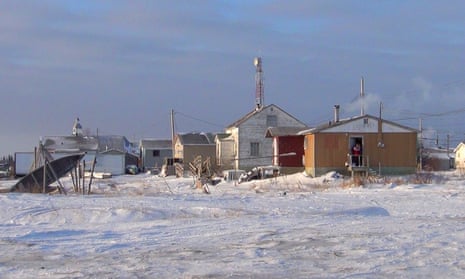The Attawapiskat First Nation, or the people of the parting rocks, as they are known in their indigenous Swampy Cree language, number roughly 2,000 souls. They live on a small Indian reserve 600 miles north of the Canadian capital of Ottawa, at the mouth of James Bay’s Attawapiskat River. This subarctic First Nation declared a state of emergency after 11 community members tried to take their own lives Saturday night.
Since last September, more than 100 Attawapiskat people have attempted suicide in what local MP Charlie Angus has described as a “rolling nightmare” of a winter. The ghastly toll reveals a grim reality with which a nation in the midst of a process of truth and reconciliation now must reckon.
Suicide does not merely roll in like a hurricane to uproot homes and families, and drown out neighborhoods before receding from where it came. No, this has been an emergency generations in the making, tacitly supported by a Canada fully willing to mine natural resources, proselytize and brutalize generations of children in residential schools, and then leave with basic housing, education systems and healthcare in a state of disrepair.
In 2011, Attawapiskat declared a state of emergency due to a “severe housing shortage”. In 2014, the community opened the first proper elementary school to serve Attawapiskat’s children in 14 years. At the same time, the De Beers mining company pulled $392m worth of diamonds out of their Victor Lake mine on lands taken from the Attawapiskat First Nation through an extension of Treaty 9 in 1930.
This is how First Nations live in the Bantustans of Canada’s north. Broke and broken people with little to no opportunities live in cold, run-down homes and suffer from generations of sexual, physical and psychological abuse. They look on as hundreds of millions of dollars worth of resources are mined from their ancestral homelands. This is not an emergency – a catastrophe for which Canada was unprepared and never saw coming. No, this is and always has been part of the design and devastation that colonization wrought.
In order to take the land, Canadian settlers needed to eliminate First Nations and their prior and legitimate political claims to territories. In the late 19th and early 20th centuries, infectious diseases and state-supported starvation gave way to the institutional violence of Indian reserves and residential schools, where more than 150,000 First Nations children were taken from 1876 to 1996. More than 6,000 children died in the residential schools and untold thousands suffered from abuse, creating nation-wide trauma that has enduring impacts on current generations.
A 2012 study in the journal of Social Science & Medicine demonstrated that residential schools had a grave mental health impact on survivors and their children, exposing multiple generations to abuse and trauma and putting children today at risk of suicide.
At the schools, indigenous languages were beaten out of children who were taught to hate their parents, their grandparents and themselves for being Indian. In Attawapiskat, as in many First Nations communities across Canada, the despair, poverty and racism of colonialism resurge in the present. The ministers and priests of generations past were so thorough that the plutocrats of today need merely slash a budget here or there and look neglectfully away while the ugly truth of Canada’s foundation reaps what it has sown. “Look at them,” the Conservative talking heads will say, “they’re killing themselves”.
Despite the spate of suicides currently devastating Attawapiskat and slowly churning through aboriginal communities throughout Canada, this First Nation – like all others – will endure through the hardship. Against all odds, Canada’s 634 First Nations have survived and even thrived in the face of colonization. Many members of the Attawapiskat community still speak Swampy Cree and derive their sustenance from the land, as their ancestors have for generations. Some critics will say that this wave of suicide is their communities’ failing – an old and tired argument that Canada should abandon the reserve system entirely in favor of urban resettlement.
But this is not about the wrongs of the Attawapiskat Nation. It is about the wrongs of another. And in Canada’s moment of truth and reconciliation the worth of a nation will be measured by its ability to right this enduring wrong. We can no longer pretend that apologies and public ceremonies are a tacit support for a wholly unjust, unequal and deadly status quo.
If Prime Minister Justin Trudeau is sincere in his commitment to build a “nation-to-nation” relationship with First Nations, he must devote resources to aboriginal communities like Attawapiskat equal to the immense wealth that has been mined from their lands and has subsidized Canada for decades. In turn, First Nations governments must use these resources to build basic infrastructure and strengthen languages and cultures devastated by residential schools. Research among First Nations in British Columbia has linked lower suicide rates to cultural continuity and strength in indigenous communities.
In the depths of a crisis faced by the people of the parting rocks but shared by First Nations across Canada, we will see the true depth of Canada’s commitment to truth and reconciliation.
